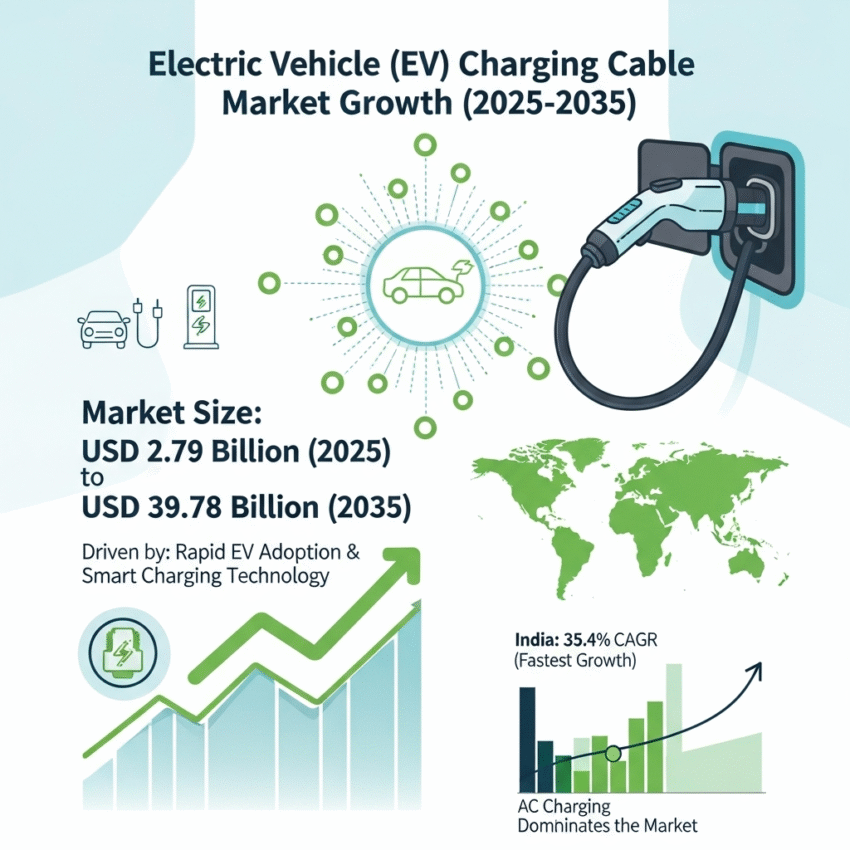The world is charging ahead—literally. The electric vehicle (EV) charging cable market, once a niche corner of the clean mobility revolution, is set to become a multi-billion-dollar powerhouse. According to fresh projections, the global EV charging cable market will surge from USD 2.79 billion in 2025 to USD 39.78 billion by 2035, growing at a remarkable 22.24% CAGR.
This growth story isn’t just about wires and connectors—it’s about the infrastructure that powers a greener future and the innovations that make electric driving practical, safe, and convenient for millions of consumers.
A Market Supercharged by EV Adoption
The catalyst behind this rapid expansion is no mystery. Governments worldwide are tightening emission norms, subsidizing EV purchases, and investing in nationwide charging networks. Meanwhile, consumers are becoming increasingly conscious of sustainability, embracing EVs not only as a transportation choice but as a statement of environmental responsibility.
Passenger cars are leading demand, but an interesting trend is emerging in Asia: electric three-wheelers. In markets like India and Southeast Asia, these vehicles are becoming urban workhorses, carrying goods and passengers in congested cities. Their rise demands cables built to withstand intense daily use, extreme heat, and frequent charging cycles.
For everyday EV owners across Europe and North America, the priority is convenience and speed. The demand for fast, affordable, and safe home-charging solutions is pushing cable manufacturers to rethink designs—making them lighter, smarter, and safer.
Innovation at the Core
Technological advancements are transforming cables from simple conduits of electricity into intelligent, high-performance tools.
- High-voltage fast-charging cables now slash charging times, making long-distance EV travel realistic.
- Flexible, lightweight designs pioneered by companies like Prysmian Group and TE Connectivity are reducing handling difficulty without compromising performance.
- Built-in safety features, such as thermal sensors and robust insulation, prevent overheating and electrical faults.
A notable launch came in 2024, when TE Connectivity unveiled its next-generation charging cable with integrated safety technologies, setting a new bar for reliability.
The industry is also embracing smart cables. Equipped with IoT, these can “talk” to cars and charging stations, optimizing charging schedules, monitoring wear and tear, and running diagnostics in real time. For cities planning smart grids, these cables are not optional extras—they are essential infrastructure.
Regulations Shaping the Market
Behind every product on the market lies a stack of regulations. EV charging cables must meet IEC 61851 and UL 2231 safety standards, comply with RoHS and ISO 14001 sustainability requirements, and pass EMC tests to avoid interfering with other electronics.
This regulatory rigor ensures that whether a consumer is plugging in at home in Berlin or at a public charger in Toronto, the experience remains safe and reliable.
The Supply Type Divide: AC vs. DC
Despite the hype around ultra-fast DC charging, AC charging cables will continue to dominate the market, expected to hold a massive 92% share in 2025.
Why? Because most EV drivers charge at home or at work, where AC power is standard and affordable. While DC fast chargers remain crucial for highways and fleet operators, AC’s convenience and cost-effectiveness secure its dominance.
Regional Spotlight: Who’s Leading the Charge?
The global market is far from uniform. Each region has its own growth drivers:
- United States (CAGR 24.5%) – Innovation is key. Local players are rolling out detachable cables and advanced designs, while government “Buy American” mandates are fueling domestic production.
- Canada (25.6%) – Harsh winters tested EVs, and they passed. Now, rising incomes are pushing adoption despite higher infrastructure costs.
- Australia (26.9%) – Climate concerns and projects like the Queensland Electric Super Highway are fast-tracking EV infrastructure.
- Japan (29.2%) – Generous tax breaks and a thriving auto industry are powering cable demand.
- India (35.4%) – The fastest-growing market, driven by consumer demand for affordable, convenient charging and government incentives to lure EV manufacturers.
Corporate Race: Smarter, Faster, Safer
The competitive landscape is buzzing. Tesla, ABB, Siemens, Prysmian, and TE Connectivity are leading with smart cables that integrate IoT, predictive maintenance, and AI-driven energy management.
Meanwhile, companies like OSRAM Licht AG and Sumitomo Electric are diversifying offerings across different power ranges. FLO’s EZLift cable management system and Kempower’s liquid-cooled fast-charging cables are examples of recent breakthroughs.
What ties these innovations together is one philosophy: make charging effortless and reliable.
Opportunities and Challenges Ahead
The outlook is bullish, but not without hurdles. The high cost of charging infrastructure could slow adoption, especially in developing nations. Still, the momentum is unmistakable. Governments are pushing local production, manufacturers are racing to add features, and consumers are increasingly demanding greener choices.
Looking ahead, expect EV charging cables to:
- Become smarter, with more IoT and AI-driven capabilities.
- Emphasize sustainability, meeting stricter recycling and material-use regulations.
- Adapt to new vehicle types, from electric trucks to pickups.
Key Companies in the EV Charging Cable Market
- OSRAM Licht AG
- Phoenix Contact
- DYDEN Corporation
- Prysmian S.p.A.
- TE Connectivity
- Leoni AG
- Aptiv
- Tesla Inc.
- Huber & Suhner AG
- Eland Cables
- Coroplast
- BRUGG Group
- BESEN Group
The EV charging cable may not seem glamorous, but it is one of the most critical pieces of the clean mobility puzzle. Without robust, safe, and smart cables, the promise of electric driving falls flat.
By 2035, as the market expands nearly 15-fold, these cables will be the quiet enablers of a massive shift—turning garages, workplaces, and highways into charging hubs that keep the electric future running.
Related Market Data : https://www.futuremarketinsights.com/reports/ev-charging-cables-market
